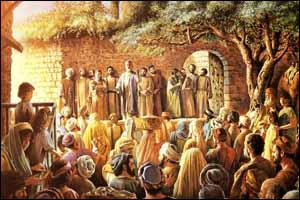Free E-Mail
Bible Studies
Beginning the Journey (for new Christians). en Español
Old Testament
Abraham
Jacob
Moses
Joshua
Gideon
David, Life of
Elijah
Psalms
Solomon
Songs of Ascent (Ps 120-135)
Isaiah
Advent/Messianic Scriptures
Daniel
Rebuild & Renew: Post-Exilic Books
Gospels
Christmas Incarnation
(Mt, Lk)
Sermon on the Mount
(Mt 5-7)
Mark
Luke's
Gospel
John's Gospel
7 Last Words of Christ
Parables
Jesus and the Kingdom
Resurrection
Apostle Peter
Acts
The Early Church
(Acts 1-12)
Apostle Paul
(Acts 12-28)
Paul's Epistles
Christ Powered Life (Rom 5-8)
1 Corinthians
2 Corinthians
Galatians
Ephesians
Vision for Church
(Eph)
Philippians
Colossians,
Philemon
1
& 2 Thessalonians
1 & 2 Timothy,
Titus
General Epistles
Hebrews
James
1 Peter
2 Peter, Jude
1, 2, and 3 John
Revelation
Revelation
Conquering Lamb of Revelation
Topical
Glorious Kingdom, The
Grace
Great Prayers
Holy Spirit, Disciple's Guide
Humility
Lamb of God
Listening for God's Voice
Lord's Supper
Names of God
Names of Jesus
Christian Art
About Us
Speaking
Contact Us
Dr. Wilson's Books
Donations
Watercolors
Sitemap
 Gathering of the early church. Unknown artist. |
In Acts we read:
"All the believers were one in heart and mind. No one claimed that any of his possessions was his own, but they shared everything they had.... There were no needy persons among them. For from time to time those who owned lands or houses sold them, brought the money from the sales and put it at the apostles' feet, and it was distributed to anyone as he had need." (Acts 4:32, 34-35)
For an exposition of this passage see Lesson 4.2.
Some have referred to the early church as socialists or communists. Is this accurate? Did the early church practice socialism as we use the term today? Did they practice communism as exemplified in the old Soviet Union and in the current People's Republic of China, for example? No, not really.
Socialism and communism are political philosophies that emerged during the Industrial Revolution as a response to exploitation of workers by capitalist business owners. Socialism is defined various ways and has lots of variations, but at its root it is characterized by public rather than private ownership of means of production, distribution, and exchange of goods (making money) in a society. In socialism, people are rewarded according to their contributions to the economy and may hold private property.
A number of countries today have embraced socialism to some degree, others have rejected it. In the United States, we see a form of voluntary economic socialism expressed in organizations such as employee-owned companies, credit unions, co-op stores, etc.
Communism arose from the teachings of Karl Marx. According to Marx's communism, there is no such thing as private property. All property is communally owned, and each person receives a portion based on needs, not on how effectively he or she labors. Marx put it this way: "From each according to his ability, to each according to his needs." Under communism, a strong central government controls production and provides citizens with food, housing, medical care, education, etc.459
While communism adopts some socialist principles, Marx envisioned a violent revolution of the working class against the middle and upper classes, a kind of revolutionary socialism. We saw these kinds of violent revolutions as communism was established in Russia and Eastern Europe under Lenin and Stalin, and in China under Mao Zedong. However, neither of these movements adopted pure communism as envisioned by Marx.
So were the early Christians communists? No, certainly not in the modern sense of the term. As we see in the account of Ananias and Sapphira (Acts 5:4), the early church believed in private property and sharing goods with the needy based on love rather than compulsion. Paul teaches
"Each man should give what he has decided in his heart to give, not reluctantly or under compulsion, for God loves a cheerful giver." (2 Corinthians 9:7)
Rather than a strong central state that compels obedience, they voluntarily serve King Jesus who has saved them.
 Paperback, PDF, Kindle book formats |
Then were the early Christians socialists? No. They did not advocate the state owning the means of production, the key element in defining what we call socialism today. However, they excelled at cooperation based on love and mutual respect. When they saw a need, people gave to meet the need. They expected people to work, if possible, and earn their own living, rather than wait for others to meet their needs (1 Thessalonians 4:11-12; 2 Thessalonians 3:6-15). However, there was a generosity in supporting those who were truly destitute, especially widows (Acts 6:1; 1 Timothy 5:3-10).
Endnotes
[459] Based on articles by Sarah Pruitt, "How Are Socialism and Communism Different," History.com, 22 Oct 2019; and articles in Wikipedia on "Socialism" and "Communism."
Copyright © 2025, Ralph F. Wilson. <pastor![]() joyfulheart.com> All rights reserved. A single copy of this article is free. Do not put this on a website. See legal, copyright, and reprint information.
joyfulheart.com> All rights reserved. A single copy of this article is free. Do not put this on a website. See legal, copyright, and reprint information.
 |

|
In-depth Bible study books
You can purchase one of Dr. Wilson's complete Bible studies in PDF, Kindle, or paperback format -- currently 48 books in the JesusWalk Bible Study Series.
Old Testament
- Abraham, Faith of
- Jacob, Life of
- Moses the Reluctant Leader
- Joshua
- Gideon
- David, Life of
- Elijah
- Psalms
- Solomon
- Songs of Ascent (Psalms 120-134)
- Isaiah
- 28 Advent Scriptures (Messianic)
- Daniel
- Rebuild & Renew: Post-Exilic Books
Gospels
- Christmas Incarnation (Mt, Lk)
- Sermon on the Mount (Mt 5-7)
- Luke's Gospel
- John's Gospel
- Seven Last Words of Christ
- Parables
- Jesus and the Kingdom of God
- Resurrection and Easter Faith
- Apostle Peter
Acts
Pauline Epistles
- Romans 5-8 (Christ-Powered Life)
- 1 Corinthians
- 2 Corinthians
- Galatians
- Ephesians
- Philippians
- Colossians, Philemon
- 1 & 2 Thessalonians
- 1 &2 Timothy, Titus
General Epistles
Revelation
Topical
